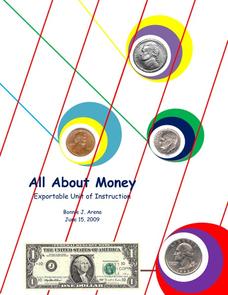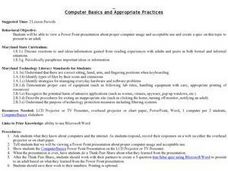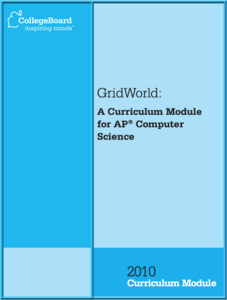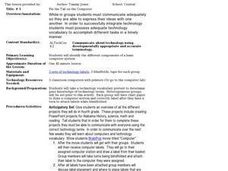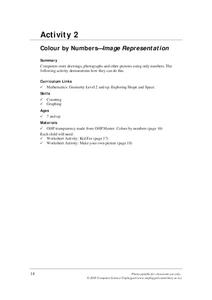Curated OER
All About Money
Few topics engage young mathematicians as much as learning about money. Through a series of shared readings and hands-on activities, children explore the US currency system, learning how to count money and calculate change as they create...
Curated OER
Computer Language
A thorough and engaging slideshow presentation discusses all things computer, from artificial intelligence programs to text messaging lingo. Computer science students will get a kick out of the examples for ELIZA, Otto Jesperson's...
Curated OER
All About Computers
Students discover facts about computers. In this technology lesson, students find out how to locate information on the Internet. Students choose a topic to research and search several sites for information.
Curated OER
All About Aid
Begin this lesson by estimating the cost of a college education and comparing it to actual data. After reading an article, high school seniors discuss the processes of the college loan corporations. They listen to a lecture about how to...
Curated OER
Computer Basics and Appropriate Use
View this PowerPoint and go over the basic rules about computers. It is well-suited for all ages because the rules apply to all learners. Everyone benefits from knowing the terms for working with computers. But more importantly, make...
Cincinnati Library
Computers for Beginner
The kids in your class are probably experts at navigating the computer, but do they know the difference between hardware and software? Teach computer skills to any level of computer user with a helpful reference sheet. It...
Computer Science Unplugged
Conversations with Computers—The Turing Test
Will the real computer please stand up? The premise of this activity is for the class to ask questions to a human and to a computer and to determine which is which. The class asks a given set of questions, and the person playing the role...
Computer Science Field Guide
Computer Science Field Guide
Imagine computer science all summed up in one book. This resource provides 16 chapters that cover many aspects of computer science, ranging from algorithms to software engineering. The e-book contains links to applets to help explain...
College Board
GridWorld: A Curriculum Module for Computer Science
Stretch out the grid. Teaching modules provide suggestions on how to use the case study, GridWorld, throughout the year as opposed to only right before the exam. The instructional units provide suggestions for presentations, assignments,...
Curated OER
Why Can’t I Have Sugar? All About Diabetes
Begin the instructional activity by having your class write what they know about diabetes. They learn through a skit how the body metabolizes glucose. A visual representation of the two types of diabetes is displayed, and then learners...
Curated OER
All About Our Town
Pupils explore brochure writing. They work in groups to brainstorm and categorize important places in their community. In addition, they gather information from the Internet, take pictures using a digital camera, and create a community...
PBS
Stories of Painkiller Addiction: Learning About Opioids
Feeling high is not the only side effect of abusing prescription opioids. Middle and high schoolers learn more about specific painkillers, including Fentanyl, Oxycodone, and Clonazepam, as well as their common brand names and extensive...
Curated OER
What is a Computer Crime?
An important lesson on cybercrimes is here for you. In it, young computer users learn about how people commit crimes on computers by hacking into accounts, and stealing personal information from people. Some excellent discussion...
Smithsonian Institution
What's the Code? Coding Robot Movements Using Sound
Tap into the desire to learn about computer codes. Pupils apply the Tap Code and the Polybius Square to send secret codes using sound. They design a code that tells a robot what movements to make and then test out their code using one of...
Teach Engineering
Automatic Floor Cleaner Computer Program Challenge
Have your class use the engineering design process to program a vacuum robot. Using computer engineering concepts, teams program an automatic floor cleaner to traverse designated patterns.
Nemours KidsHealth
Online Safety: Grades 3-5
In two lessons all about online safety, scholars assist Nina in making smart decisions. First, they finish a speech started by the computer to detail why Nina's internet activity isn't safe and what she should do instead. Second,...
Curated OER
Descending to the Challenge: Developing Documentaries About the Deep Ocean
The video clip that comprises the warm up is not available, but the related article from The New York Times and the movie trailer for Aliens of the Deep are, leaving enough material to make this a fascinating lesson on deep-sea...
Curated OER
All About Plants
Young scholars identify plant needs. In this biology lesson, students watch All About Plants and then write a paragraph describing the various details about plants.
Curated OER
Computer Science Education Week
Equip students for the 21st century by exploring the fun of computer science.
Curated OER
Hear Ye, Hear Ye: Read All About It!
Develop an online newspaper covering the Lewis and Clark Expedition. The class publishes their newspaper on the school's Web site and analyze both primary and secondary sources.
Curated OER
Computers
In this computers worksheet, learners fill in the blanks to sentences that talk about computers. Students complete 15 sentences.
Curated OER
Pin the Tail on the Computer
Students identify the basic components of the computer system. They watch a Brain Pop movie about computers and then draw a "vocabulary label" from a basket. The student is blindfolded and sticks the label on a picture of a computer....
Computer Science Unplugged
Colour by Numbers–Image Representation
How do computers store and send images? Here's an activity that explains one way a computer can compress image information. Pupils decode run-length coding to produce a black and white image. Pairs then work together to code and...
Code.org
Number Systems
Generating a system of shapes. Groups work together to create a number system using three different shapes as symbols. The groups should come up with the rules that generate all the possible permutations of the three shapes.


